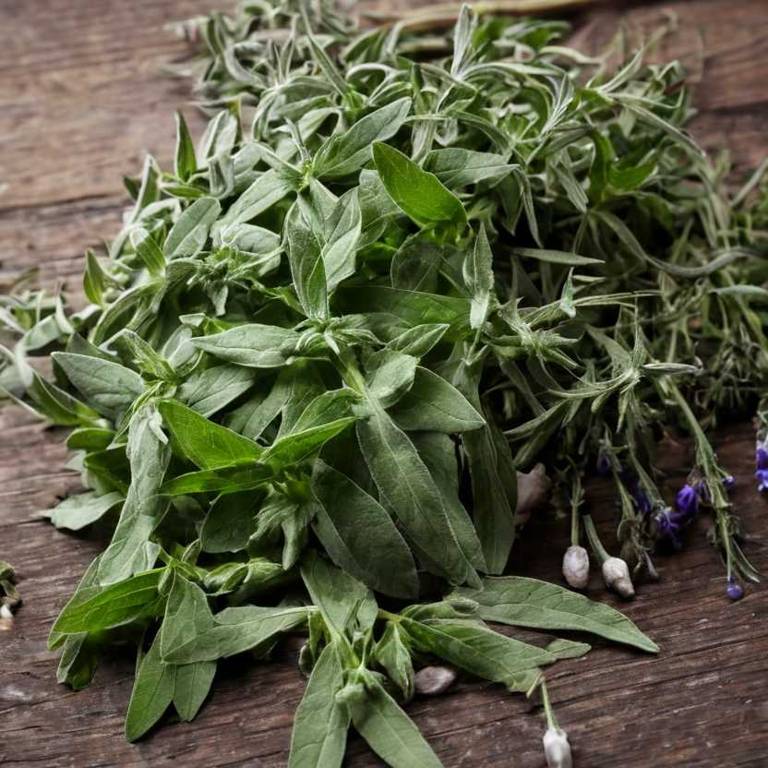10 Best Salvia Sclarea Health Benefits

Salvia sclarea, commonly known as clary sage, offers a range of health benefits due to its rich content of essential oils and bioactive compounds.
It is widely used in aromatherapy for its calming effects, helping to reduce stress and anxiety by promoting relaxation and improving mood. The plant also has anti-inflammatory properties that may support digestive health and alleviate symptoms of gastrointestinal disorders. Additionally, Salvia sclarea has been studied for its potential role in hormone regulation, particularly in managing menstrual discomfort and menopausal symptoms.
Its antioxidant properties further contribute to overall wellness by protecting cells from oxidative damage and supporting immune function.
1. Promotes calmness
Salvia sclarea promotes calmness by interacting with the body's nervous system to reduce stress and anxiety.
Its calming properties are attributed to the presence of bioactive compounds such as linalool and linalyl acetate, which have been shown to have sedative and mood-enhancing effects. When used in aromatherapy or as a herbal supplement, Salvia sclarea can help alleviate feelings of tension and promote a sense of relaxation. This makes it a popular choice for those seeking natural remedies for emotional balance and mental clarity.
Regular use of Salvia sclarea may contribute to long-term emotional well-being and improved sleep quality.
2. Reduces stress
Salvia sclarea reduces stress by promoting relaxation and calming the nervous system.
Its essential oils contain compounds like linalool and sclareol, which have been shown to have anxiolytic properties. These compounds may help lower cortisol levels, a hormone associated with stress. Regular use of Salvia sclarea in aromatherapy or as a supplement can support emotional balance.
This makes it a valuable natural remedy for managing stress and improving overall well-being.
3. Improves sleep
Salvia sclarea improves sleep by promoting relaxation and reducing anxiety, which are common contributors to insomnia.
Its calming properties are attributed to the presence of compounds like linalool and lavandin, which have sedative effects on the central nervous system. Studies suggest that Salvia sclarea can help regulate the sleep-wake cycle, leading to better quality sleep. It is often used in aromatherapy and herbal remedies to support restful nights.
Incorporating Salvia sclarea into bedtime routines may offer a natural alternative for those seeking to enhance their sleep without pharmaceutical interventions.
4. Boosts mood
Salvia sclarea boosts mood by promoting the production of serotonin, a neurotransmitter associated with feelings of well-being and happiness.
Its calming properties help reduce anxiety and stress, which can indirectly enhance emotional balance. This herb has been traditionally used in aromatherapy and herbal medicine to uplift spirits and alleviate depressive symptoms. The essential oils derived from Salvia sclarea contain compounds like linalool and sclareol, which have been shown to have mood-enhancing effects.
Incorporating Salvia sclarea into daily routines, whether through essential oils, teas, or topical applications, can support a more positive and balanced emotional state.
5. Enhances focus
Salvia sclarea enhances focus by promoting mental clarity and reducing distractions through its calming effects on the nervous system.
This herb contains compounds like rosmarinic acid and flavonoids, which may support cognitive function and improve attention span. Its use in traditional medicine and modern herbal supplements highlights its potential to aid individuals struggling with concentration or attention disorders. By balancing mood and reducing anxiety, Salvia sclarea helps create an optimal mental state for focused tasks.
Overall, it serves as a natural aid for enhancing mental performance and maintaining sustained attention.
6. Supports digestion
Salvia sclarea supports digestion by promoting the secretion of digestive enzymes and reducing gastrointestinal discomfort.
Its natural compounds, such as flavonoids and essential oils, help soothe the digestive tract and improve nutrient absorption. This herb is often used to alleviate symptoms of bloating, gas, and indigestion. Regular use of Salvia sclarea can enhance overall digestive health and function.
As a result, it is a valuable herbal remedy for those seeking natural support for their digestive system.
7. Reduces inflammation
Salvia sclarea reduces inflammation by containing bioactive compounds such as rosmarinic acid and flavonoids, which have potent anti-inflammatory properties.
These compounds work by inhibiting the production of pro-inflammatory cytokines and reducing oxidative stress in the body. Studies have shown that Salvia sclarea can be effective in alleviating symptoms associated with inflammatory conditions such as arthritis and skin disorders. Its anti-inflammatory effects make it a valuable natural remedy for supporting overall immune health.
Regular use of Salvia sclarea may help manage chronic inflammation and promote tissue healing.
8. Improves skin health
Salvia sclarea improves skin health by promoting a balanced complexion and reducing inflammation.
Its antioxidant properties help neutralize free radicals, which can damage skin cells and accelerate aging. The herb contains essential oils that have antimicrobial effects, making it useful for treating acne and other skin infections. It also aids in moisturizing the skin and enhancing its natural barrier function.
Regular use of Salvia sclarea-based products can lead to healthier, more radiant skin.
9. Aids respiratory health
Salvia sclarea aids respiratory health by reducing inflammation and easing breathing difficulties.
Its essential oils contain compounds like linalool and cineole, which have natural decongestant properties. These compounds help loosen mucus and clear airways, making it beneficial for conditions like bronchitis and asthma. Additionally, Salvia sclarea supports the immune system, helping the body fight off respiratory infections more effectively.
Regular use of Salvia sclarea in the form of essential oils or herbal teas can promote clearer breathing and overall lung function.
10. Supports hormonal balance
Salvia sclarea supports hormonal balance by influencing the endocrine system through its phytoestrogenic properties.
These compounds can help regulate estrogen levels, which is particularly beneficial for women experiencing menstrual irregularities or menopausal symptoms. The herb also exhibits adaptogenic qualities, aiding the body in managing stress and, in turn, supporting the production and regulation of hormones. Its traditional use in herbal medicine aligns with its modern scientific validation for promoting internal harmony.
By modulating hormonal fluctuations, Salvia sclarea can contribute to overall well-being and emotional stability.